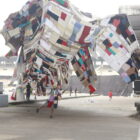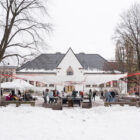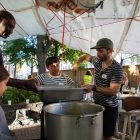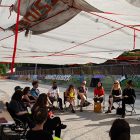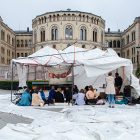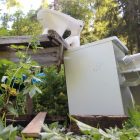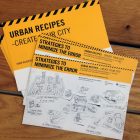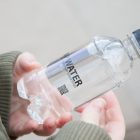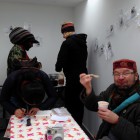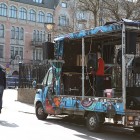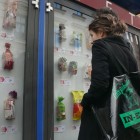Urban Intervention
re-(t)exHile
The Migrant Assembly #4
The Migrant Assembly #3
The Migrant Assembly #2
The Migrant Assembly #1
Deconstructing an explicit content
OUTSIDER
strategies to minimize the error
1000 bottles of tap water
Do It YourSelf
Kitchen dialogues come from the idea of lounging around the kitchen outside of the consumption system through the alternative of creating various social interactions. The project aims to change consumer sensory intellectual concept of overproduction of food from supermarkets. Apart of that, we also like to focus on another aspect of the project, which involves transport/ smuggling of waste though, Europe. Not only we personally hunt the food in the local dumpsters, but we also move the food from place to place to offer to different audience variety of products not possible to gather in the that place. The formula we seek in Kitchen dialogues is that people can taste "the problem of surplus".
The project has as a reference “Food” of Gordon Matta-Clark, Rirkrit Tiravanija relational works, Dieter Roth, “Eat Art” of Daniel Spoerri, “Food Cultura” by Antonio Miralda or Filippo Tommaso Marinetti and Fillia's “Manifesto of Futurist Cooking”.
The exhibition is part of a larger project that has taken part and form in many different way around Europe and Asia. shown at Trailer gallery in Umeå, Sweden in march 2015.
The Protester
This sound documentation presents an urban intervention, which took place in Malmö on the 29th of March, 2012, between 12pm -2pm.
Through a powerful sound system installed in a danish van used for demonstration in Copenhagen, we drove through the city projecting the sound of a crowd. “The Protest” started in Möllevångstorget and proceeded towards Triangeln, Föreningsgatan, Amiralsgatan and then surrounded the old town with 2 breaks at Stortorget and Gustav Adolfs Torg with a final stop in Triangeln.
The installation presents 8 sound tracks of documentation recorded during the event. The first 5 tracks, in chronological order, were recorded during the first 20 minutes of walking from Möllevångstorget to Triangeln. The next 3 tracks refer to the part between the breaks at Stortorget and Gustav Adolfs Torg.
36 Grocery
36 groceries questions enhancement and development, current production models and existing consumption in the first world. Market strategies no consistent with the sustainability of our natural resources.
The current laws and prosecutions of the control of food quality within international agencies and government policies, require the food companies, food logistic parks and supermarkets to scrap food products containing any deterioration in its wrapper or container, and food products without being perishable at the moment.
We are showing 36 food products with some deterioration in its wrapper or container in 5 advertising show cases of the Gothenburg University. These food products were collected in a trash containers of the Swedish supermarket company "Willy’s”.
